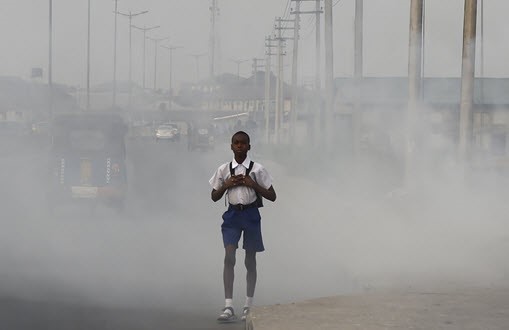Story by UN Environment
Air pollution is all around us. Indoors, outdoors, in cities and in the countryside. It affects us all, whether we realize it or not. For the longest time, we have taken the air we breathe for granted. There was air, there were smells, there was cold wind, there was hot air.
But recent research has started to shed light on some rather worrisome aspects of what the air around us really contains, and how it affects our bodies. And the more we learn, the more we come to realize that this essential source of life for the planet needs some serious taking care of. Without air there can be no life but breathing polluted air condemns us to a life of disease and early death.
Now that we know how air pollution harms us, there is no excuse not to act. Below are five great reasons to reduce and eliminate air pollution from our lives.
Polluted air is creating a health emergency
There is no doubt today that air pollution is a global public health emergency. It threatens everyone from unborn babies to children walking to school, to women cooking over open fires.
On the street and inside the house, the sources of air pollution can be very different, yet their effects are equally deadly: asthma, other respiratory illnesses and heart disease are among the adverse health effects known to be caused by polluted air.
According to the World Health Organization, every year around 7 million premature deaths are attributable to air pollution—a staggering 800 people every hour or 13 every minute. Overall, air pollution is responsible for more deaths than many other risk factors, including malnutrition, alcohol use and physical inactivity.
Children are most at risk
Globally, 93 per cent of all children breathe air that contains higher concentrations of pollutants than the World Health Organization (WHO) considers safe to human health. As a result,600,000 children die prematurely each year because of air pollution. As if that were not enough, exposure to dirty air also harms brain development, leading to cognitive and motor impairments, while at the same time putting children at greater risk for chronic disease later in life.
Household air pollution is particularly harmful to women and children due to their traditional home-based roles in many cultures. About 60 per cent of household air pollution-related deaths globally are among women and children, and more than half of all pneumonia deaths in children under five can be attributed to indoor air pollution.

Being shorter than adults, children are more affected by ground-level pollution from exhaust fumes. Photo by Jack Kavanagh/UN Environment.
Pollution and poverty go hand in hand
Air pollution goes to the heart of social justice and global inequality, disproportionately affecting poor people.
In homes, air pollution comes mostly from fuels and high-emitting heating and cooking systems. Clean cooking and heating fuels and technologies are out of reach for low-income families, so polluting alternatives are the norm. About 3 billion people depend on burning solid fuels or kerosene to meet household energy needs and 3.8 million of them will die each year from exposure to these pollutants. A lack of awareness of the risks associated with breathing polluted air also contributes to the problem, as well as the cost and difficulty to access healthcare.
Crowded cities and trafficked suburbs are hotspots for outdoor air pollution. According to the World Health Organization, 97 per cent of cities in low- and middle-income countries with more than 100,000 inhabitants do not meet the minimum air quality levels. Around 4 million of the approximately 7 million people who die from air pollution-related diseases every year live in the Asia-Pacific region.
In high-income countries, 29 per cent of cities fall short of meeting the organization’s guidelines. But in those countries, too, poorer communities are often those most exposed—power plants, factories, incinerators and busy roads are often located in or near poor suburban communities.
The cheaper the fuels, the higher the costs
When people get sick, the entire community suffers. Ill people require medical care and medicine, children skip school and working adults miss days of work, either as a result of their own poor health, or to care for a loved one. According to the World Bank, air pollution costs the global economy more than US$5 trillion every year in welfare costs and $225 billion in lost income.
A 2016 study by the Organization for Economic Cooperation and Development predicts that, if the situation remains unchanged, by 2060 the annual global welfare costs of premature deaths from outdoor air pollution would be US$18-25 trillion, with the costs of pain and suffering from illness estimated at around US$2.2 trillion.
There are other less direct costs, which nonetheless affect us globally. Ground-level ozone is expected to reduce staple crop yields by 26 per cent by 2030, creating food security and nutrition challenges. Air pollution also degrades materials and coatings, decreasing their useful life and generating costs for cleaning, repair and replacement.
UN Environment’s sixth Global Environment Outlook estimates that climate mitigation actions for achieving the Paris Agreement targets would cost about US$22 trillion. Meanwhile, by reducing air pollution, we could save US$54 trillion in combined health benefits. The math is clear: acting now against air pollution translates into saving US$32 trillion.
The right to clean air is a human right
The right to a healthy environment enjoys constitutional status—the strongest form of legal protection available—in more than 100 countries. At least 155 states are legally obligated, through treaties, constitutions and legislation, to respect, protect and fulfil the right to a healthy environment.
The right to clean air is also embedded in the Universal Declaration of Human Rights and the International Covenant on Economic, Social and Cultural Rights, and fully enshrined in the Sustainable Development Goals—the global blueprint for peace and prosperity.
Ready to take action?
Find out what you can do to involve your business, school and families. And call on your government to enforce the World Health Organization guidelines for ambient and indoor air quality.
Remember, clean air is your right!
Read the original article here>>



